First of three parts…
—
Writer, artist and genuinely nice guy David Mack talked with us about his Kabuki Library Edition Vol. 3 — out 7/13 — as well as his work on Fight Club 2 and everything else that he’s got going on these days. We checked in on David a year ago, so if you missed those, click here and here. For PART 2 of this latest conversation, in which Mack talks about Jessica Jones and working with Amanda Palmer and Vincent D’Onofrio, click here.
By G.D. KENNEDY
Comics as a medium are fascinating, a merger of visual art and narrative that opens a world of storytelling possibilities not otherwise be viable in other formats. But for all of this potential, they also are often formulaic, stagnant, tied to the same tropes and conventions that have held them for decades, relying on linear narratives and the tautology of the superhero/villain paradigm. Even indie press attempts to stretch the medium often find themselves tied to the same histories, reliant on violence as a centerpiece for (or at least climax to) drama and conflict, and bounded by the simplistic narrative of good and evil.
All of which makes David Mack’s Kabuki one of the most compelling stories out there, both for what it offers as a story, but more broadly about what it suggests about the possibilities of the comic medium itself, and its potential for evolution beyond plot driven narratives. Kabuki started as Mack’s senior college thesis and the first volume was a black-and-white crime drama, a cyber-punk noir piece that was also incredibly personal, following the story of the titular character as she broke from the constraints of an oppressive spy network in order to write her own story.
But Kabuki is more about what the character and the book as a whole becomes, a shift from tradition into something new. The final volume of Kabuki’s story — The Alchemy — is a story about evolution, of artistic creation and exploration of self and purpose. It is, in many ways, a primer on artistic creation and endeavor, not so much driven by external plot lines but by internal forces. And it is all set against Mack’s surreal art which seamlessly shifts between styles to match the tone of the book — it shifts from watercolors to mixed media to simple ink, whatever the book calls for. It is a heady book, but it is hard to read it and not be inspired, to not want to pick up a pen and paper and try to create something beautiful.
Dark Horse began republishing the different Kabuki volumes in Library Editions last year — we spoke to David about Kabuki Library Edition Vol. 1 last summer (as well as his work on Daredevil and Fight Club 2) — and the retrospective element of these collected works highlights the remarkable evolution that the series — and the artist — went through in creating the series over time. On 7/13, Kabuki Library Edition Vol. 3 hits stores; this edition is anchored by The Alchemy, but comes with a bevy of other shorter pieces: short stories, unpublished works, a piece from a Philadelphia Museum of Art show, essays, and other tidbits.
We had the opportunity to chat with David recently about the new volume, his contributions to Chuck Palahniuk’s Fight Club 2 (also from Dark Horse), and some other projects he’s been working on. Here’s the first part of what David had to say:
—
G.D. Kennedy: The third Kabuki Library Edition is coming out July 13, and it will include the Alchemy and some other material, including some new Kabuki works. The Alchemy is essentially the end of Kabuki’s story — how does it feel to have spent so much time over the last few years digging through your work on this character to build the library editions?
David Mack: I’m grateful to have these Library Editions from Dark Horse collect the entirety of the Kabuki stories, and especially THIS story, in such a massive and deluxe format. Each of these volumes is at least 400 pages and includes loads of extras and new material.
It was a joy to visit these characters and stories and do completely new paintings and drawings to be a part of the new design of these books. These oversize volumes give such a completely different experience to read the stories in this size and scale.
My work has never looked better than in this book in particular. I consider this book the best example of my work as a writer and as an artist collected in one book. If you ever considered reading my books or had any interest in my work, THIS is the book to get. Even if it is the first book of mine that you ever looked at. This is one that you can begin with. And it gives you context for any other work I have done.
G.D.: Kabuki has been a very personal series from the outset. But there is a very real shift in the Alchemy to existential ruminations, as the series moves away from Kabuki reacting and responding to the world around her, to creating a space for herself, free of (or at least with acceptance of) the baggage of her past. What brought about this shift? Why were you focusing so much on transition at the time?
David: I think of this book as a very practical book, as much as, and even MORE than, a philosophical one. If you consider the first Kabuki a kind of crime story or ghost story, and the next one a kind of prison/institution escape story with psychological intrigue and governmental agencies . . . .
This story opens with the character in a place that a lot of people find themselves and can relate to when they leave one chapter of their life and must begin another, be it a job, college, a relationship … they were trained for one thing, groomed for one thing, but now must find their own place in the world.
When I was at that stage in my life, I had to ask myself a few questions: What is my place in this life, what am I meant to do here. What are practical ways to find that out? And upon figuring that out, what are practical steps for making that a reality. Those practical steps for both of these questions are encrypted into the story.
G.D.: I think one of my favorite parts of The Alchemy is its idea of War of Art, as opposed to Art of War, and the notion of social upheaval results from artistic revolution and cultural shifts, not over violence. What is the “War of Art”? How do you see it affecting us? Do you see this a war we can lose?
David: It’s a war that is won and lost every day. The term War of Art comes from Stephen Pressfield’s book in which he names a force “Resistance” as the force that any creative person must combat each day, and all day, in order to accomplish anything creative.
Anyone who has ever tried to write anything or complete anything creative knows the challenge involved in overcoming internal and external resistances (the second guessing, the procrastinations, the primal fears of failure and success, the unconscious self-sabotage, as well as external obstacles) before their dreams can be made into a real world physical form and then affect the material world.
G.D.: The Alchemy is very focused on the concept of creation, and in particular the creative process. Your notes on the story talk about some of the processes you developed in connection with writing the Alchemy, including changing your sleep schedule and utilizing the “idea focus” concept. What were some of the processes that you adopted to promote creativity while you were working on this book?
David: The biggest step, is when you have an idea, write it down. It sounds obvious, but its the first step in taking a concept from your head and now making it exist in the three-dimensional material world. This works for ideas of stories, and things you want to visualize happening in your story or in your life. I found that visualizing ideas, and making lists for your story in a creative way is also great training for making that happen in your life.
For this story, I took 20 years of intense story and art making, and reverse-engineered some principles that I had developed for that. To work at your “A” game, at maximum efficiency and power, and encrypted that as principles in the story itself. You want to work and think at your peek performance, when creating your work. And it’s not a bad idea in the rest of your life either.
I had developed eating, sleeping and exercise rhythms to give me the best effect for each stage of my work and I put that in the book. As well as the idea of Einstein’s rule-breaking, to go beyond the paved road to discover new idea territory, the idea of playfulness to be open to new ideas, and each of the ideas in the book . . . even the more avant guard ideas . . . I was practicing each of those while making the chapters that feature them.
I was living the methods as I wrote about them, and many of them are based on trial and error solutions that I had developed over the two decades prior to the story, to find ways to be able to best create books each day and at my highest level, while still experimenting, working conceptually, and breaking new ground.
G.D.: In rereading The Alchemy, I’m reminded of how inspirational it is — not just in the sense of how it makes the reader want to create, but also how it is almost like a primer on immersive creativity and how to stretch perspective. Was this something that you set out to create with this book?
David: It was something I had experienced in my efforts to make books. So I let it be one of the levels of the story in this book.
G.D.: Despite the fact that Kabuki comes from a bloody past, there is no violence throughout all of The Alchemy. This is something that has often bothered me — comics near-complete reliance on violence to frame drama. In your notes in the Library Edition, you mention this was a personal challenge for you. Why did you decide to do this?
David: I don’t like using templates or tropes for no reason. And I don’t like the idea of action (and especially violence) as a crutch or excuse, or as the empty illusion of story. I want the actions to be organic to the characters and stories and I think if you put characters with very strong points of view (with conscious motivations & unconscious motivations) interacting with each other, they will make the story interesting as their strong points of view interact.
I did create an entire book where there is not a single act of violence in this story. It was a challenge that I put out for myself in this story as I knew it as a different kind of story. There are protagonists, and there are global and internal antagonistic forces that are confronted and battled with.
But in this story the protagonist was forced to find more clever solutions to dealing with the forces against her. There is the idea of beating the opposing forces at their own game, but also of creating a new paradigm. Don’t play their game, but create a new one.
G.D.: One of the things that I found most fascinating in the new Library Edition was your description of the interactive process that took place between you and readers in creating The Alchemy, like how they would send you items and objects that you incorporate into your artwork for the series, making the book and its creation alchemical in and of itself. What was the impetus for making the book such an interactive process? How did this effect the story or the art?
David: It just happened in the process. I didn’t plan it at first. From the beginning, readers began sending me things to include in my art work. Miss Fumiko of the First Zen Institute of America would send me writings and fabrics that I would collage into the textures of images sometimes.
For the issue with the envelopes, I asked readers to send me envelopes and stamps from all over the world. And then I included their stamps that they sent for Akemi’s stamps on the messages that she was sending all over the world. Including envelopes in the story that readers had written and drawn on.
Many readers can look at certain pages and see things that they sent to me. A four-leaf clover, hand written envelopes, origami images, glow in the dark stars and moon that Chuck Palahniuk sent me. Story scenes are inspired from actual experiences as well. Chapter 8 opens with a scene inspired by a sushi dinner discussion with Neil Gaiman in which we were discussing the symbolic act of a kiss as the indication of the final act of several mythic stories.
—
NEXT: More Kabuki! PLUS: Jessica Jones, Amanda Palmer and Vincent D’Onofrio … Click here.

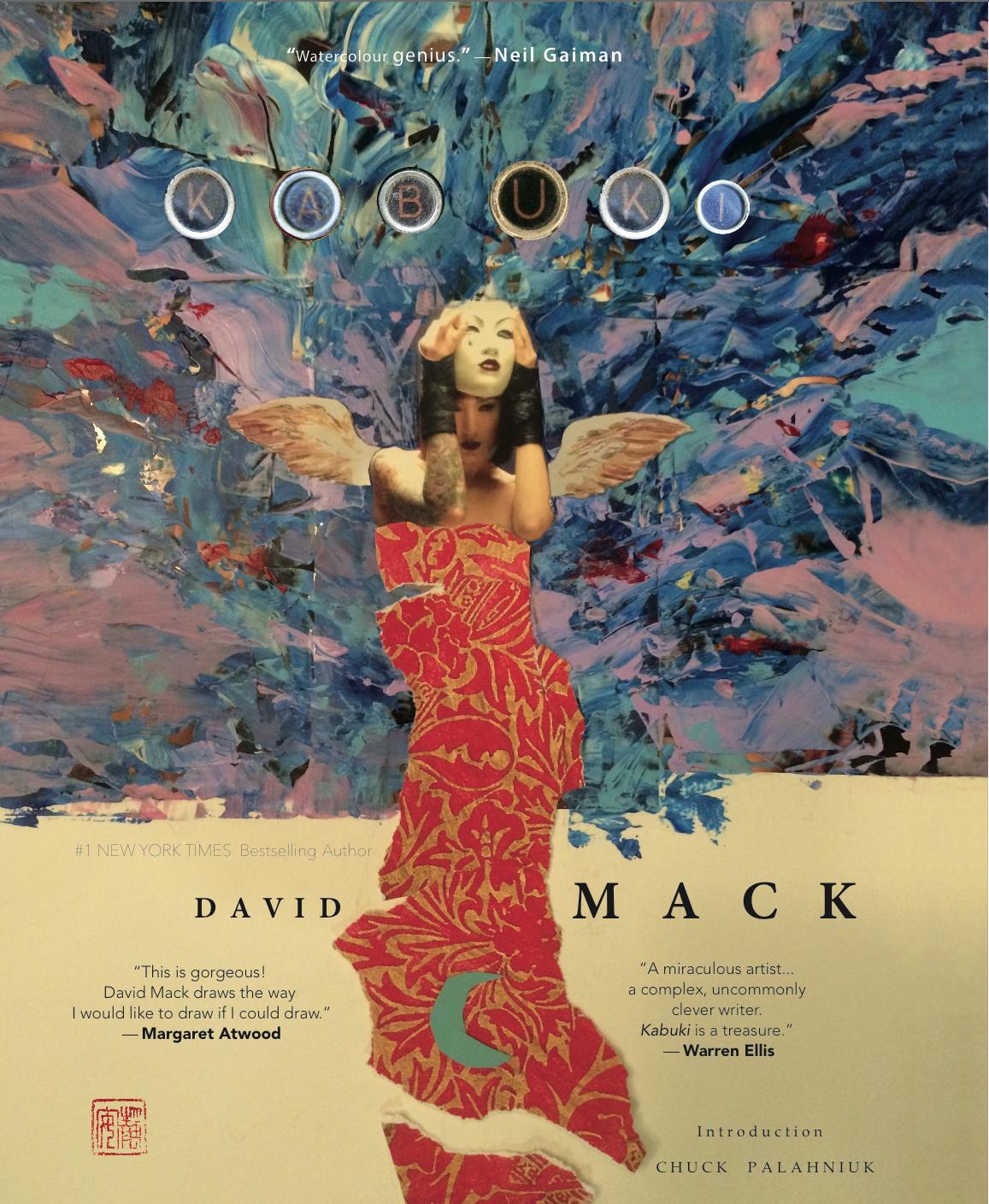
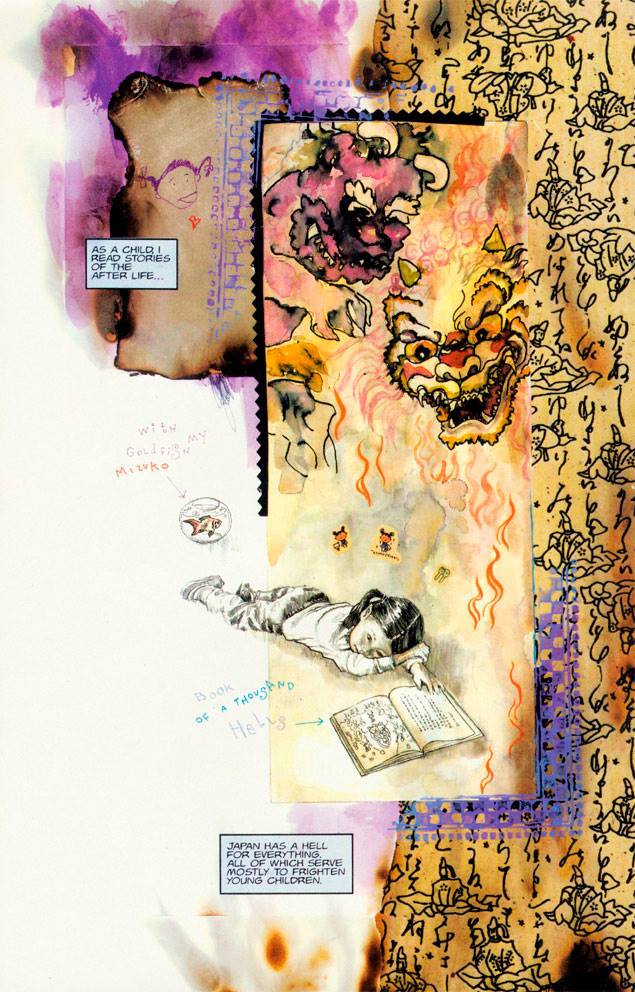
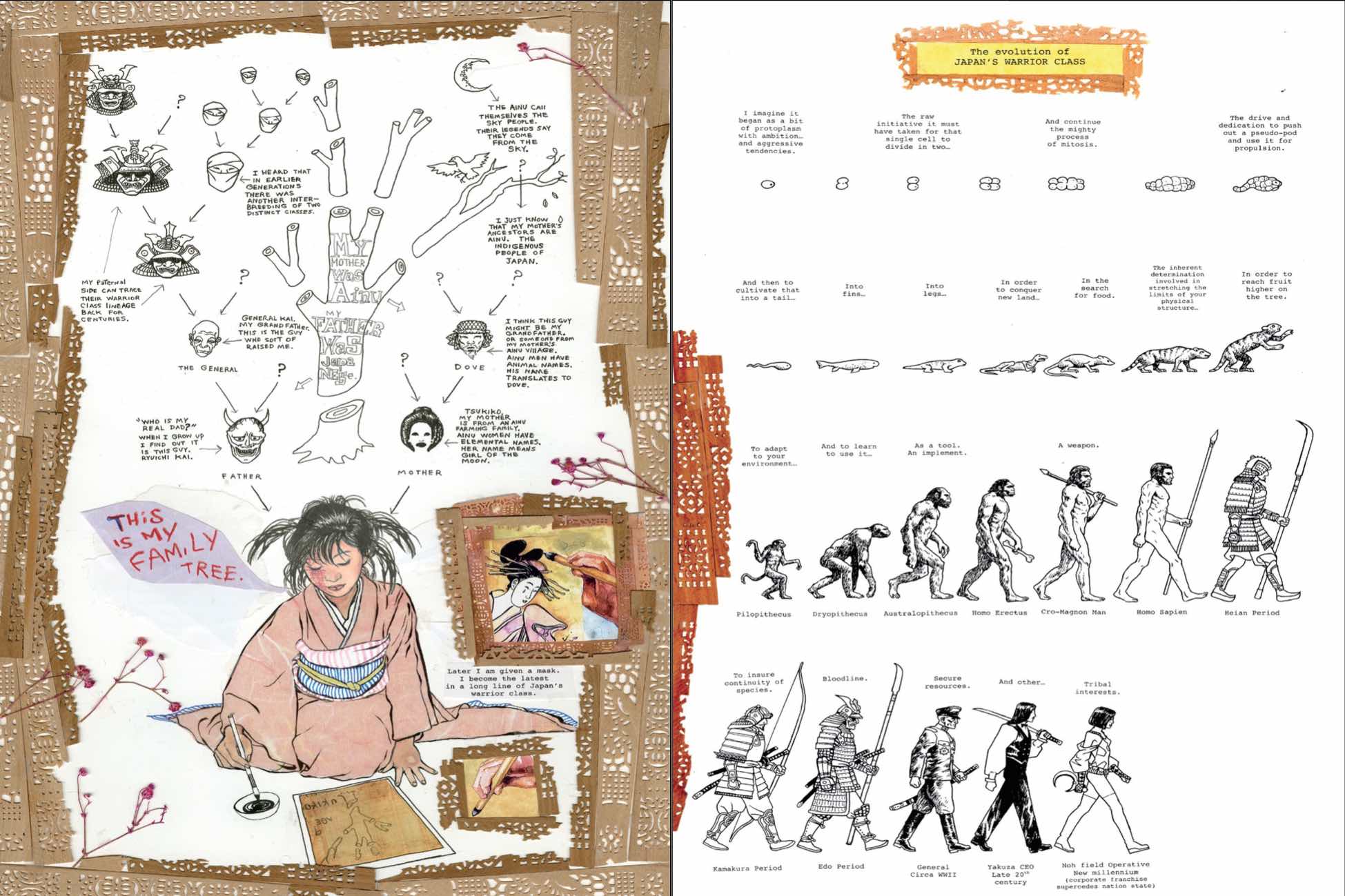
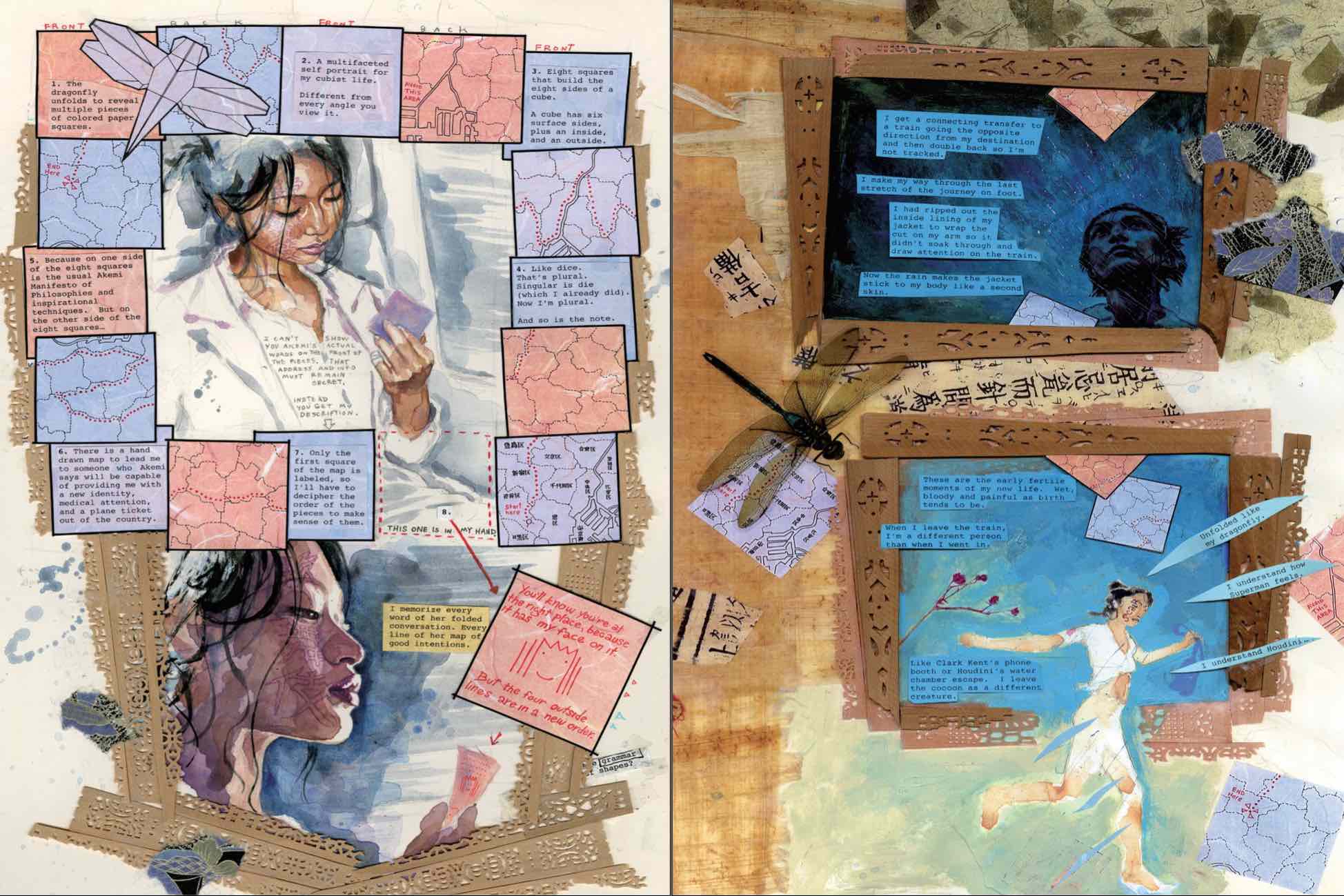
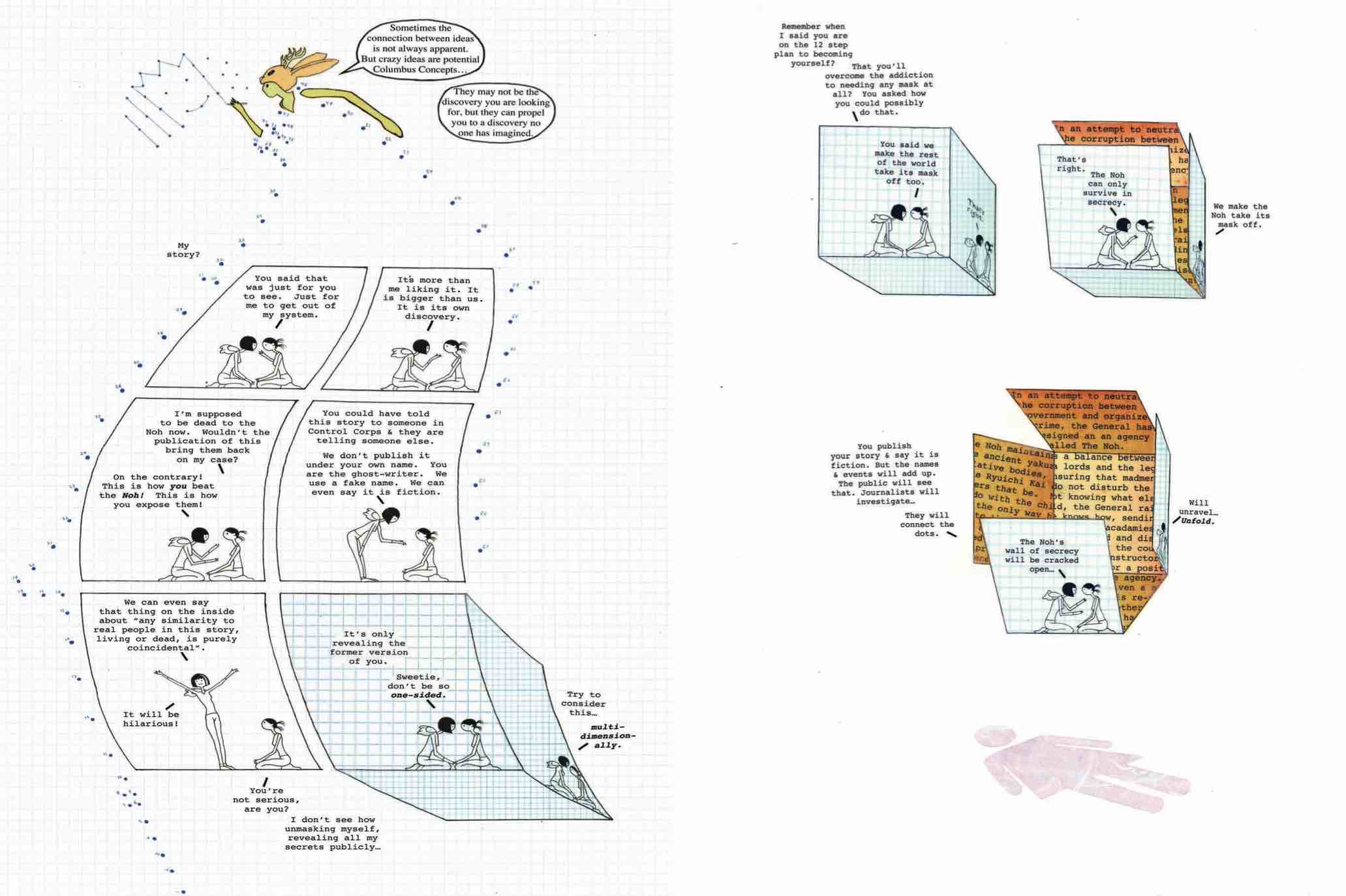
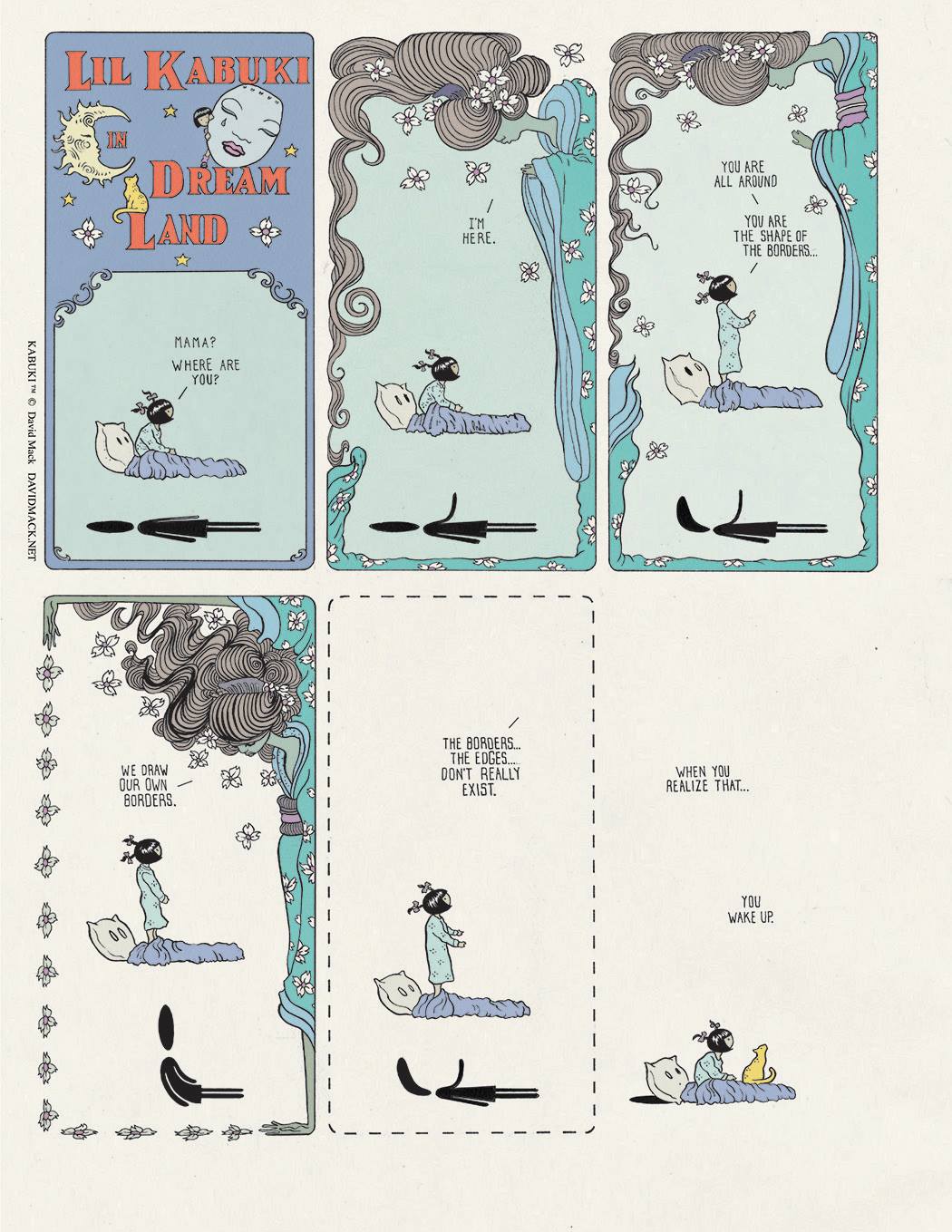
Trackbacks/Pingbacks